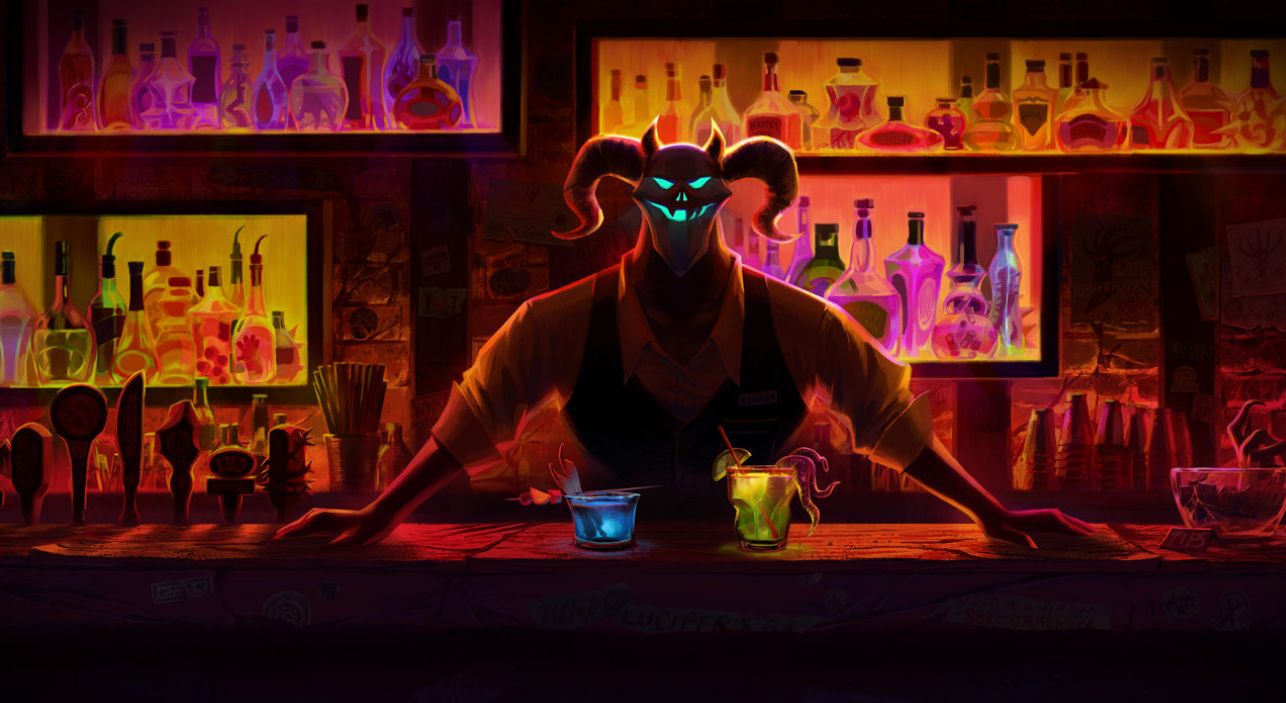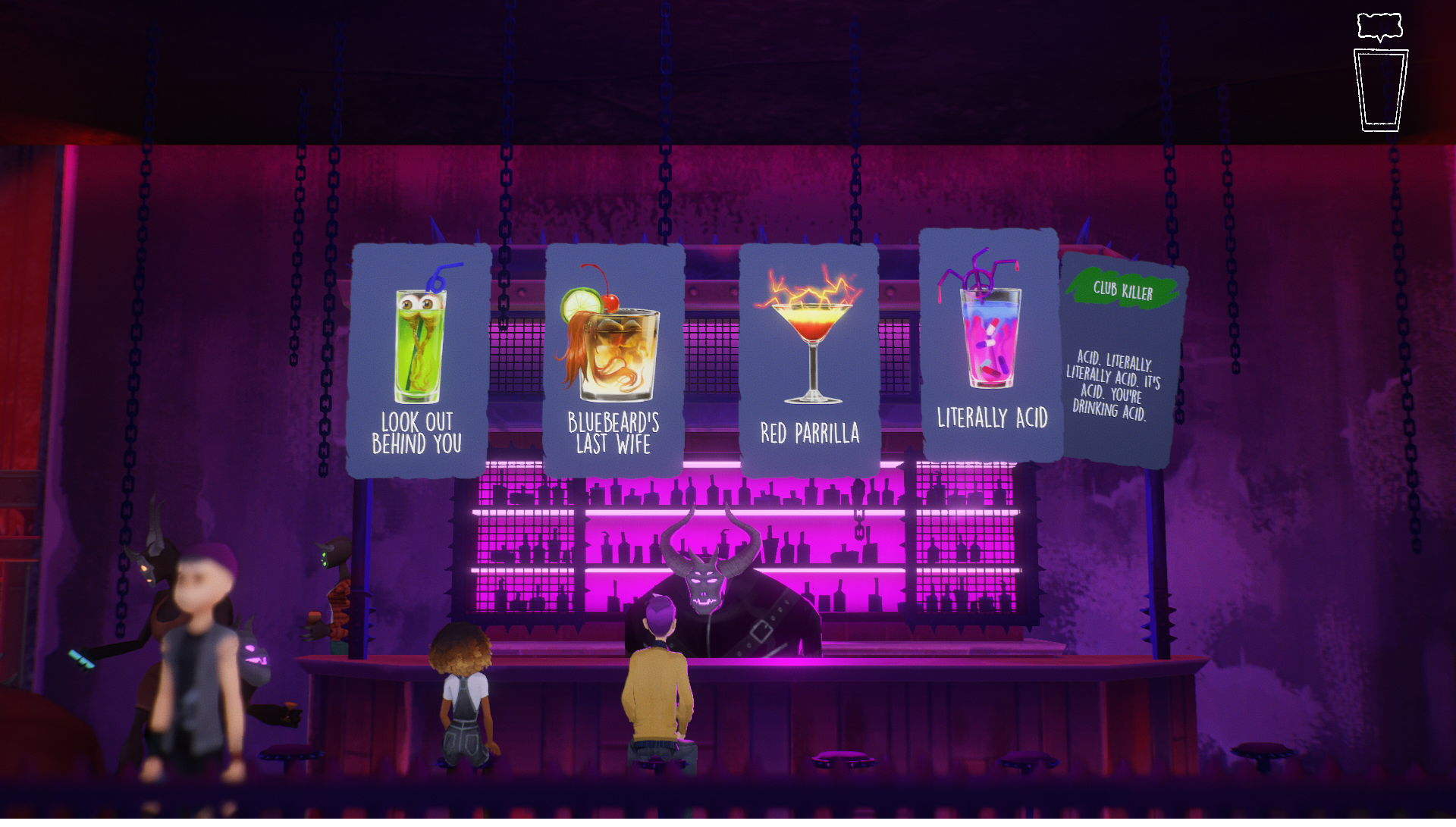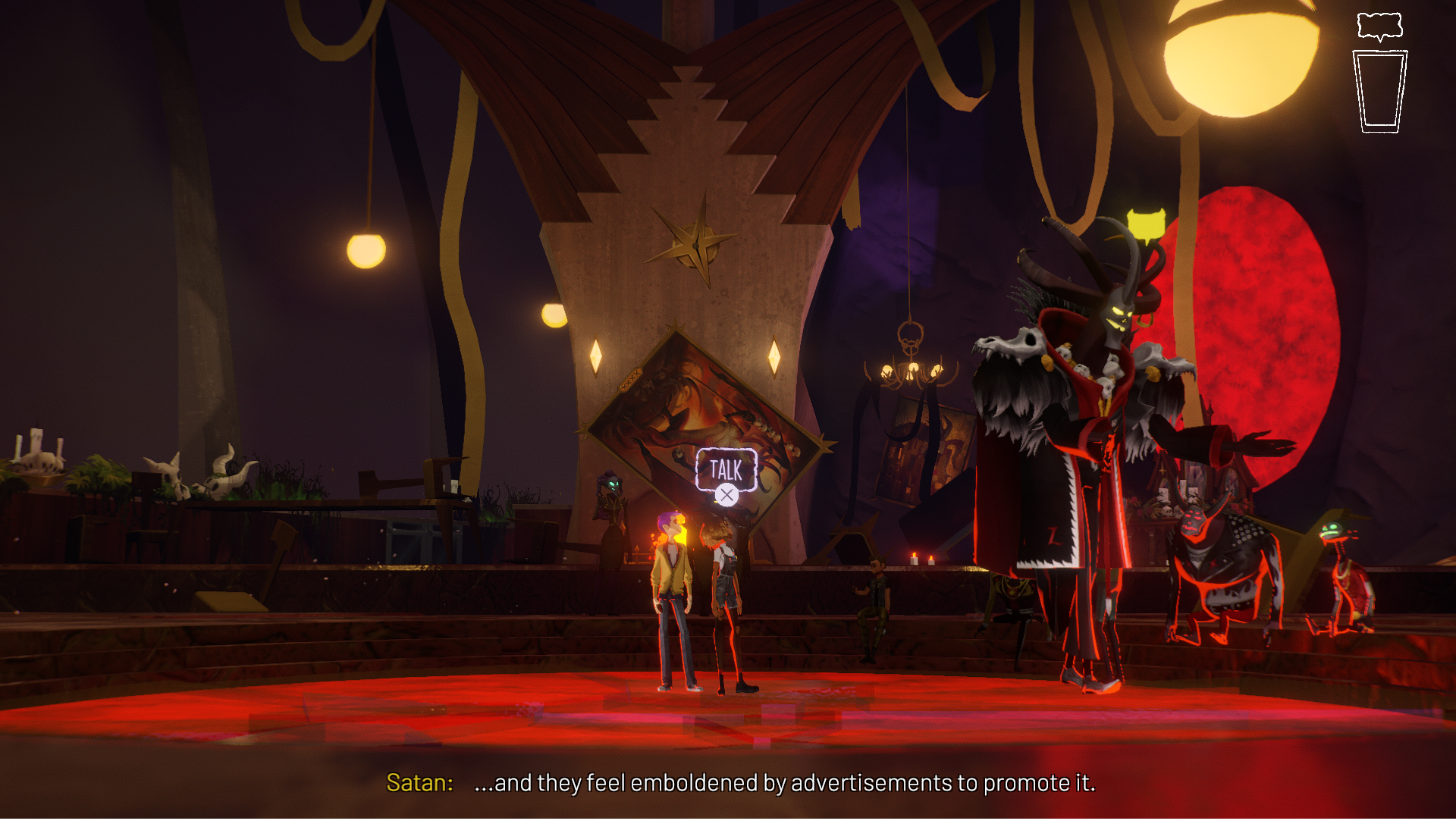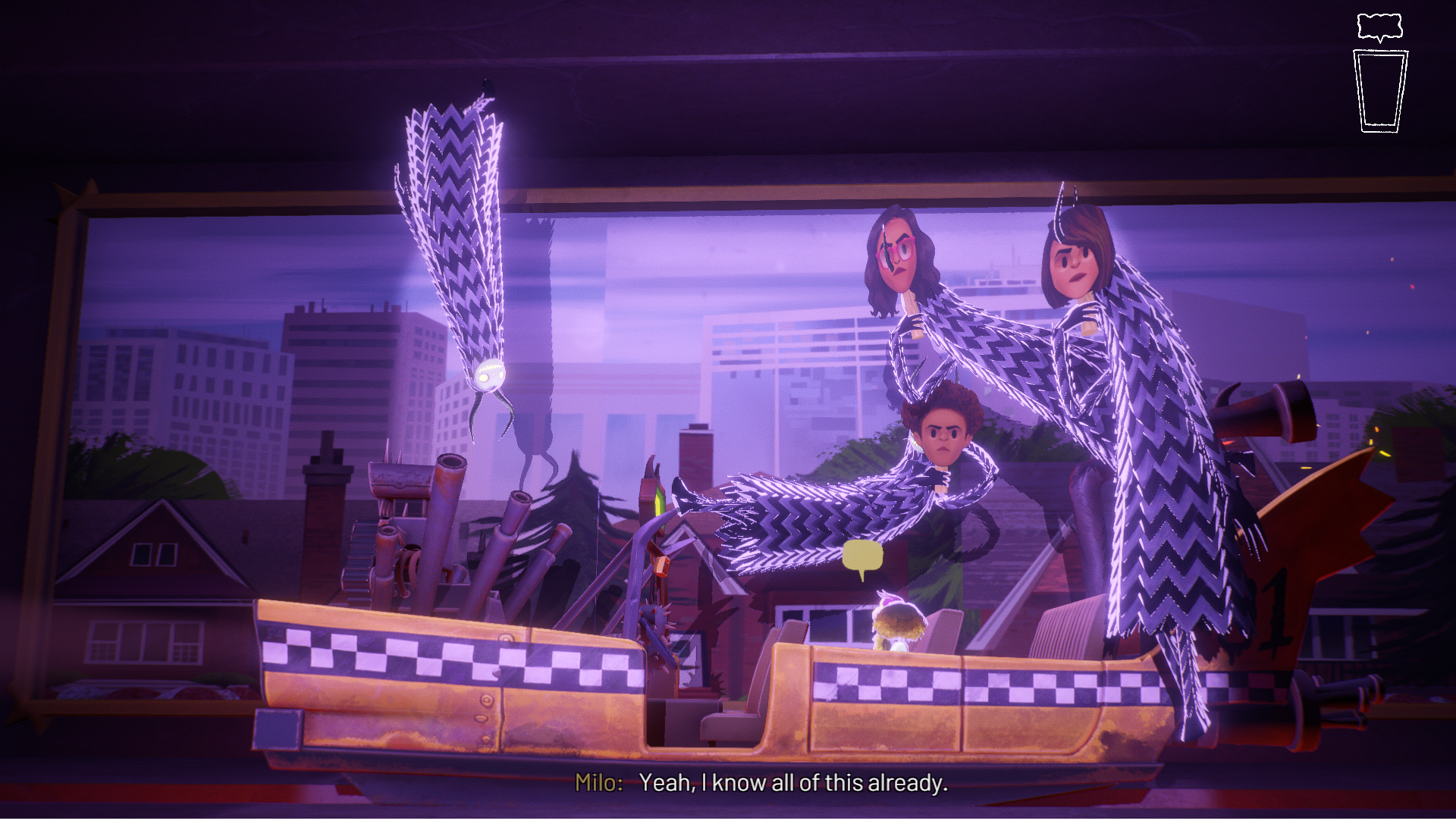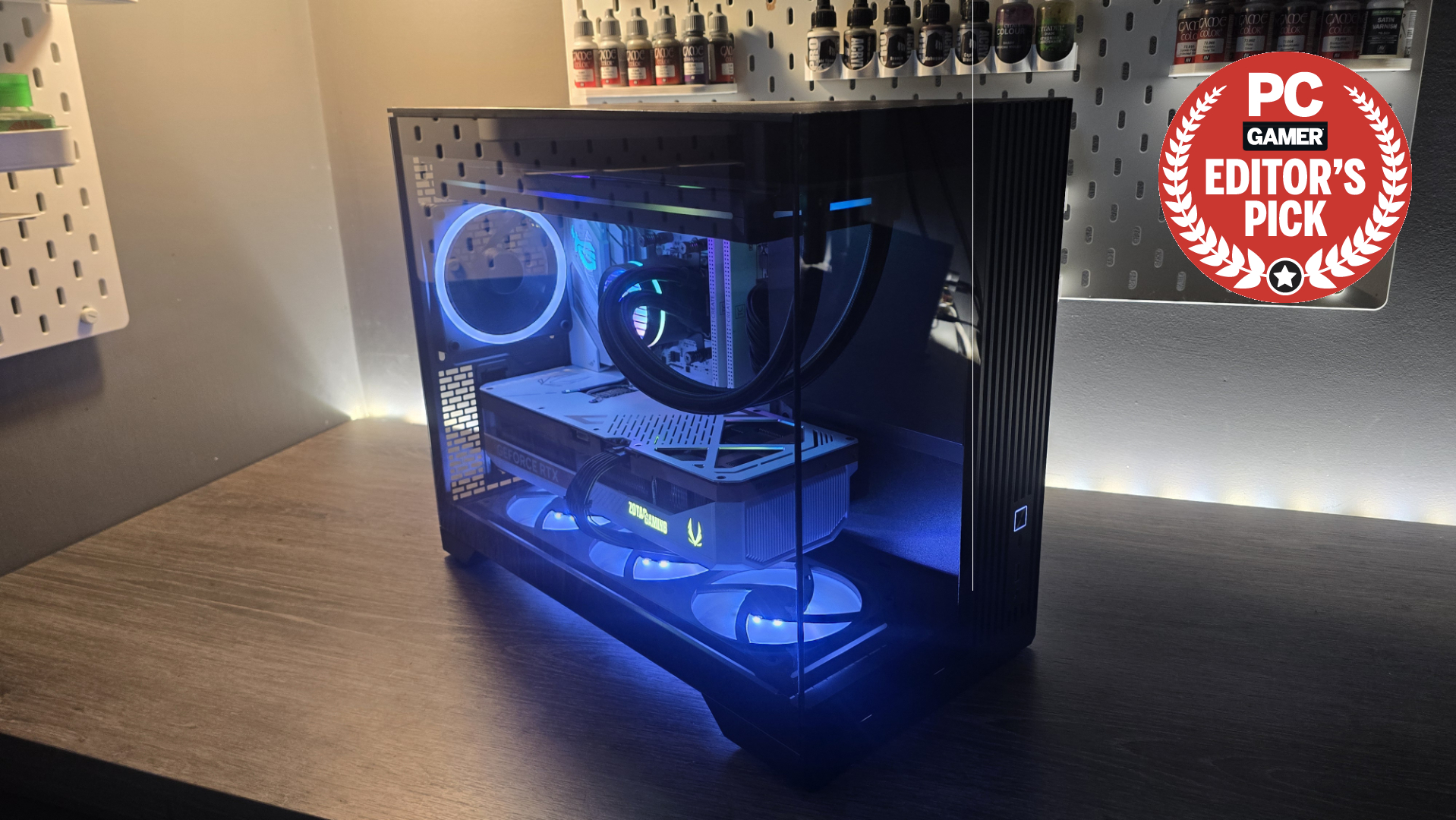Our Verdict
The top-notch writing and superb voice acting, coupled with the visually vibrant hellscape, keeps your interest from start to finish.
PC Gamer's got your back
What is it? A branching narrative adventure
Expect to Pay: $20/£16. Also available on Xbox Game Pass
Developer: Night School Studio
Publisher: In-house
Reviewed on: GTX 1070, i7-8700, 16GB RAM, SSD
Multiplayer: None
Link: Offical Website
Hell is where everything you order is delivered by UPS. Hell is where you have to read every single subtweet that might be about you. Hell is a queue that never ends. Hell is being kicked out of a bar because you have to fill out paperwork. Hell is where you condemn a terminally ill med student to the Ninth Circle in order to get into a party.
Oh, and there's also an Arby's. Welcome to Afterparty.
To clarify, Afterparty is a branching narrative drinking game set in Hell. Our protagonists are Lola and Milo—played by Janina Gavnkar and Khoi Dao respectively—two recently deceased college graduates who have been best friends nearly their entire life. With no memory of how they got there, Lola and Milo find themselves trapped in Hell and the only way back home is to out drink Satan himself. There are obstacles, of course. Demon bouncers to get past, VIPs to schmooze, and conversational minefields to navigate. Hell is a social battleground, one that timid Milo and anxious Lola are ill-suited to deal with. Fortunately, they have the crutch of alcohol to see them through their journey.
While in conversation, a sip of your lethally strong beverage will grant you a new dialogue option. The response you gain depends on what you are drinking. When ordering your drink a helpful little annotation gives you an idea of the dozens of possible effects: sports drinks let you bluff about Arsenal's ludicrous display last night, a Bluebeards Last Wife turns everything you say into sea shanty pirate speech. A drink called "Literal Acid" does exactly what you'd expect and my personal favourite, the Wit Enhancer, allows you to respond to everything with bad jokes and awful puns. The real torture.
Fundamentally it's simple to play. You move left and right along a 2.5D plane and interact with points of interest. Most of your time will be spent talking and partying with the denizens of Hell—demons and damned souls both—with the occasional game of beer pong or a dance-off to mix things up. The real meat of Afterparty is found in its multiple-choice conversation system.
As other characters speak, two possible responses appear above Lola or Milo's head, with control periodically switching between the two. The responses themselves are usually positive or negative; hospitable or hostile. The third option, which appears based on what you drink, is a wild card, and generally the most entertaining. Never pass up an opportunity to make a dick joke at a demon's expense.
There are no unnatural pauses in conversation—you choose your response with a single button press before the other person finishes talking. Of course, "silence is also a valid option". The responses are unambiguous and you are given plenty of time to choose. This simple design allows you to focus and enjoy the conversation as it takes place, while also keeping it moving at a natural pace.
Keep up to date with the most important stories and the best deals, as picked by the PC Gamer team.
Possibly a first for videogames, the bar talk is actually engaging. I spent a lot of time standing around doing nothing just to listen in on other people's conversations. Ironically, Hell is full of life. Every time you take a drink the music grows louder, the bass beats stronger and your vision gets a little hazy.
The diegetic music in the clubs is, unfortunately, a little underwhelming. This is probably to ensure it never gets in the way of the dialogue, and the silence in between bar stops helps mitigate their lack of real presence. While that’s no doubt for the best, I never wanted to stay in a club to keep listening to a song. With all the great musicians that no doubt made their way to Hell, I was hoping for a few new additions to my Spotify playlist.
Lola and Milo encounter many characters and personalities as they drink their way home, and during their interactions—especially with their own literal personal demon—you quickly grow to understand them as well as the dynamics of their relationship. A special mention goes to Dave Fennoy who voices the charismatic Lucifer Morningstar. Satan meanders around his mansion, drink in hand, in a pair of winkle picker boots, openly musing on humanity's great faults and reciting scripture as source material to his enraptured and inebriated audience. There was a surprising amount of depth to be found in the literal devil.
Afterparty is predominantly about drinking, specifically the culture around it and the people it attracts. I grew concerned, as I was playing, that Afterparty was starting to glorify it all. Portraying drinking as this perfect and wonderful thing, laughing off all of the repercussions and acting like the answer to every situation is another shot or drinking game. However, my concerns were quickly addressed.
It is essentially the definitive night out simulator. You try out new drinks and travel between bars. You meet and connect with incredible people and, after a few more drinks and, uninhibited by doubt, start to do progressively stupider things. The repercussions aren't a real concern; it's a bit of fun, you're invincible, you'll be leaving soon anyway. After tonight, you'll probably never see any of these people again, so why hold back?
But inevitably the revelries draw to a close. The bars empty, the clubs begin to close, and a guy, legs spread wide, pisses on the side of a building with one hand pressed against the wall to hold himself upright. As a new day arrives, you're forced to face reality and the problems you didn’t want to acknowledge. The game gets surprisingly sobering. Honestly, the only thing Afterparty is missing is the nightclub bathrooms, although I suppose that may have been too horrifying, even for Hell.
During my playthrough, I didn’t encounter any major bugs, but I did notice a repeat stuttering that occurred when characters would start a new animation. Sometimes the person speaking would levitate off the ground a few inches, Satan's cape once tried to fly off of his shoulders and, every time the taxi dropped me off at his place, it did a 90 degrees wheelie in the river of lava for a few frames. These issues weren’t huge, but seeing such a beautiful, well-animated game regularly stutter does break the illusion. It’s never nice to lose your immersion.
I’ve only completed a single playthrough, but when time permits, I look forward to returning for my after-Afterparty to see what other routes Lola and Milo could have taken and who else they may have met. I feel like there was a lot I missed out on here; characters that I never met. There were clearly multiple, different solutions I could have explored with Lola and Milo. It seems like these different paths might have changed their destination, and possibly even them.
I had high expectations for Afterparty. I was expecting a comedy title, set in a fantasy world that could have been from a Noel Fielding sketch. But the very real relationship between Lola and Milo, the witty humour that had me chuckling every minute and the audacity on show from Night School Studio to go where they did, at the risk of their player's discomfort, made Afterparty even more than I thought it could be.
The top-notch writing and superb voice acting, coupled with the visually vibrant hellscape, keeps your interest from start to finish.
